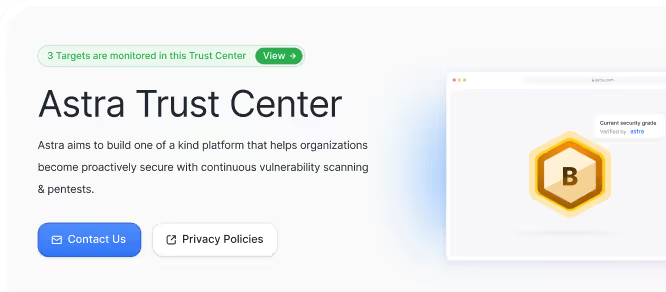
Software Security Testing Services
Software Security Testing Services to Ensure Compliance & Data Safety
Expert-led VAPT + automated DAST to find, exploit, and remediate critical software vulnerabilities

Types of vulnerabilities we detect
Our software security service proactively detects and helps remediate critical security flaws across your entire software ecosystem








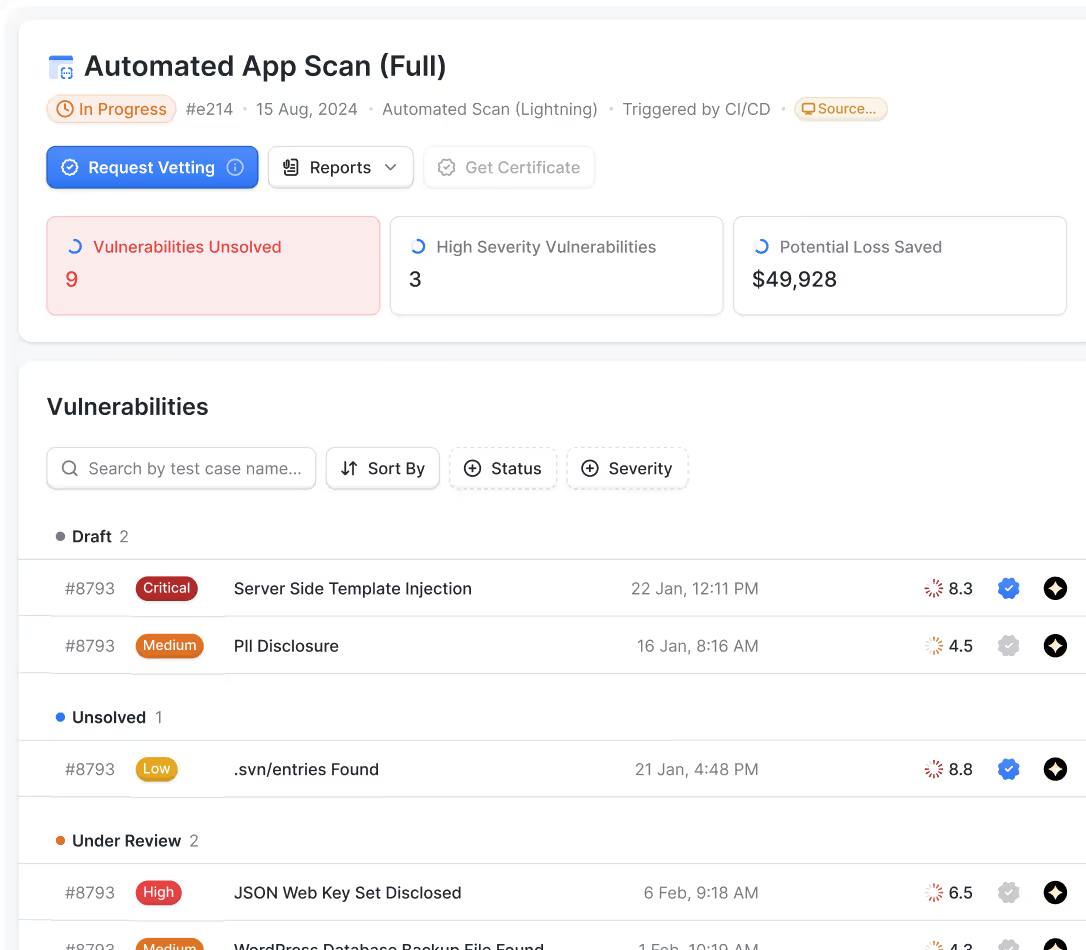
Don't let simulated attacks become real breaches. Our expert-led software security testing service validates your defenses.
Secure nowStay compliant throughout the year
- Get Compliance-Ready for ISO, SOC2, GDPR, CIS, and HIPAA with Astra.
- Actionable insights & continuous pentesting for meeting regulations

- Check for Emerging CVEs, OWASP Top 10 & SANS 25 with our Continuous Pentest.
- Identify & address CVEs in real time with continuous scans and regression tests.

Astra's 7-Step Pentest Process
How our software security testing service works
Whether you're testing monoliths or microservices, Astra’s 7-step process uncovers security risks with the depth of manual pentesting and the speed of automation, all in one platform.
Discovery & Scoping
- Define assets/scope quickly via our platform and onboarding session.


Authentication Setup
- Enable deep analysis, including behind-login risks, with easy auth flows.
Automated Baseline
- Run 24/7 scanner across web, API, cloud, and network layers: OWASP, CVEs, business logic, config missteps.


Risk Scoring & Prioritization
- Prioritize findings by exploitability, business impact, and compliance relevance.
Remediation Support
- Receive clear, actionable fix steps, direct access to remediation consultants, and repeat scans as needed.


Re-Scanning & Reporting
- Continuous re-testing verifies that threats stay fixed and new risks don’t slip through. Comprehensive CXO-friendly reporting and a verifiable certification for your security posture.
Why choose Astra?
Every pentest our security engineers perform feeds back into our DAST vulnerability scanner.
That means we're not just relying on known CVEs - we're continuously learning
from real-world hacks performed during pentests.
Precision Results
- Noise-filtered vulnerabilities with intelligent detection logic
- False positives? Get them vetted by our experts
- Mark false positives to skip them in future scans
- Additional white-glove vulnerability vetting by expert security engineers

Compliance-First Approach
- Audit-ready reports aligned with ISO, PCI, SOC 2, HIPAA, GDPR, OWASP, NIST, and more.
- Expert support to simplify assessments and pass audits faster.
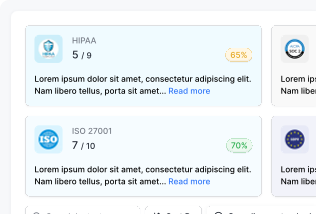
DevOps Integration
- Integrate into CI/CD with GitHub Actions, GitLab CI, Jenkins, Bitbucket, and more.
- Automate scans, send vulnerability alerts via Slack
- Create JIRA tickets, all without leaving your pipeline.

End-to-End, Fully Managed Platform
- Continuous, scheduled DAST scans for web apps, API, and cloud without manual setup or tuning.
- Expert-tuned accuracy with optimized scanners to reduce false positives.
- Vulnerabilities triaged and mapped to real business impact.
- Auto-generated compliance-grade summaries with remediation guidance and automated rescans for verification
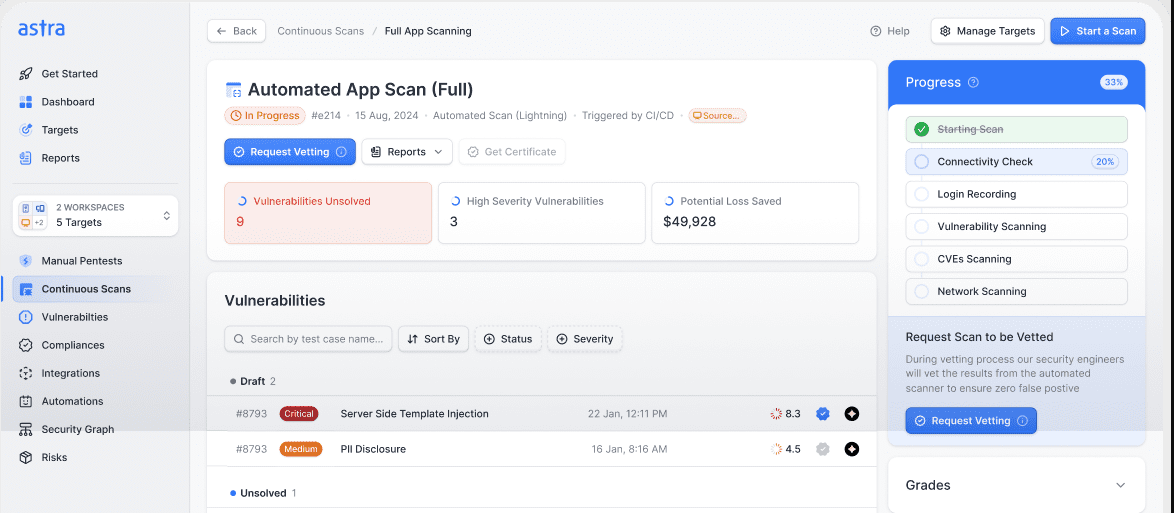
AI-Powered Intelligence
- Our AI tailors test scenarios to your unique app
- Contextual remediation advice at your fingertips
- Continuously improves detection accuracy through context-aware analysis and evolving ML models trained on real-world vulnerability patterns.
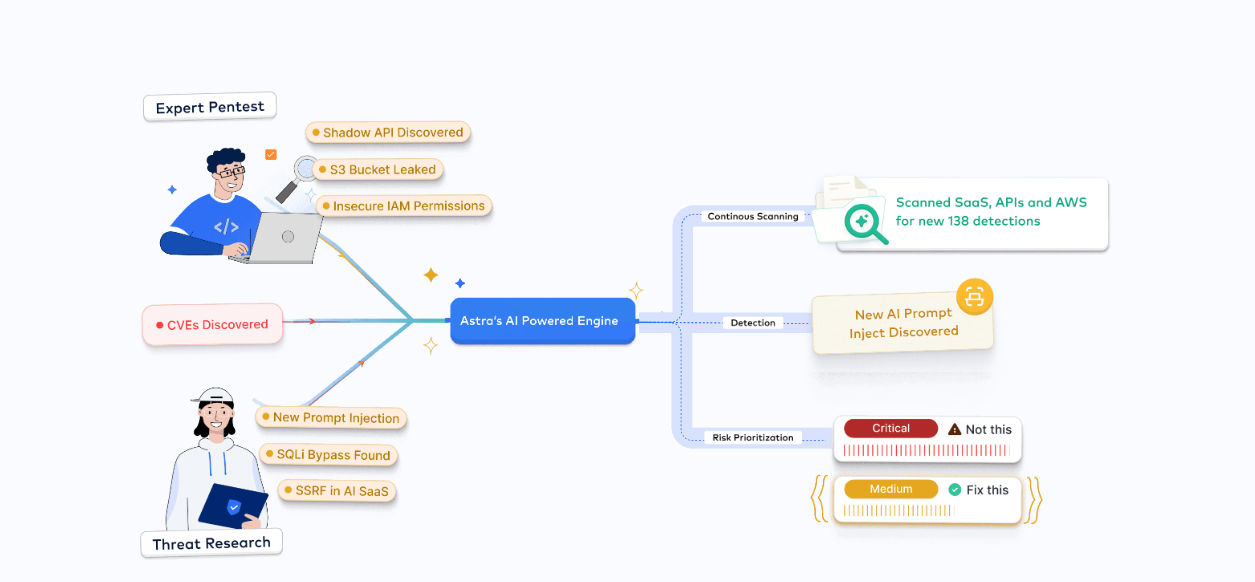
Don’t wait for the next attack. Our software security testing service finds flaws before deployment.
Secure now





Trust isn't claimed, it's earned
Astra meets global standards with accreditations from



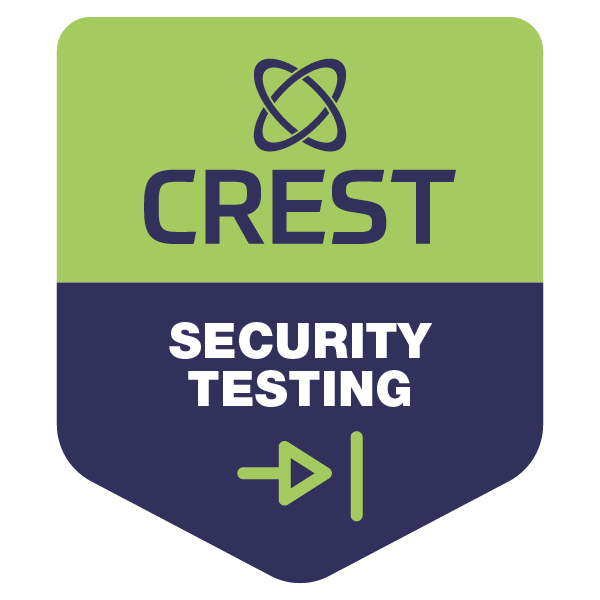
Our pentesters? World class, certified & contributors to top security projects
We find the bugs before the bad guys do
Our team stays ahead of the curve in the ever-evolving world of web security

.avif)
.avif)
.avif)

Stop chasing false positives and manual processes. Get fully managed software security testing service with expert-vetted results.
Get startedFrom startups to fortune companies,
1000+ companies trust Astra












































.webp)





Frequently asked questions
What is software security testing, and why is it important?
Software security testing checks software for vulnerabilities to protect against cyberattacks and data breaches. It’s crucial for safeguarding sensitive data, ensuring compliance, and maintaining system reliability and user trust.
How does software security testing differ from penetration testing?
Software security testing is a broad, often automated scan to flag possible vulnerabilities. In contrast, penetration testing is a deeper, expert-driven, real-world attack simulation that exploits issues and gives detailed remediation guidance.
What types of vulnerabilities are identified in software testing?
Software security testing detects common flaws like SQL injection, cross-site scripting (XSS), authentication bypasses, misconfigurations, logic flaws, and insecure input handling. Essentially, anything that could let attackers in.
What’s the difference between black box, grey box, and white box testing?
Black box testing examines software functionality without internal knowledge. White box testing analyzes internal code and logic, and grey box testing combines both, using partial internal knowledge for thorough evaluation.
Can software security testing be automated, or do you need manual testing?
Automation (e.g., vulnerability scanners, DAST) can catch many issues efficiently and continuously, but manual testing is essential to uncover complex logic flaws or chained exploits that DAST tools may miss.











